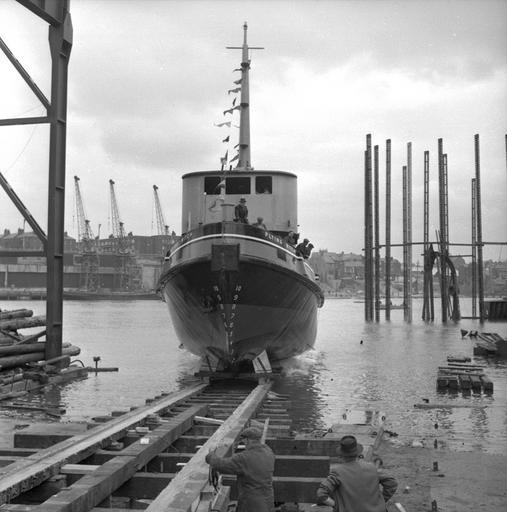MAKE A MEME
View Large Image

| View Original: | Launch_of_the_tugboat_'Flying_Witch'.jpg (836x844) | |||
| Download: | Original | Medium | Small | Thumb |
| Courtesy of: | www.flickr.com | More Like This | ||
| Keywords: sunderland shipbuilding j.l. thompson & sons ltd jlthompsonsonsltd flying witch flyingwitch tugboats blackandwhite monochrome outdoor black and white View of ‘Flying Witch’ sliding down the ways, 9 June 1960. She was launched by J.L. Thompson & Sons Ltd at the former shipyard of John Crown & Sons, Sunderland (TWAM ref. DT.TUR/2/24495BB). Tyne & Wear Archives is proud to present a selection of images from its Sunderland shipbuilding collections. The set has been produced to celebrate Sunderland History Fair on 7 June 2014. It's a reminder of the thousands of vessels launched on the River Wear and the many outstanding achievements of Sunderland’s shipyards and their workers. These photographs reflect Sunderland’s history of innovation in shipbuilding and marine engineering from the development of turret ships in the 1890s through to the design for SD14s in the 1960s. The Sunderland shipbuilding collections are full of fascinating stories. Some of these are represented in this set, such as the ‘Rondefjell’, launched in two halves on the River Wear by John Crown & Sons Ltd and then joined together on the River Tyne. The set also shows the vital part that Sunderland’s shipbuilding industry played during the First World War. William Doxford & Sons Ltd built Royal Naval destroyers such as HMS Opal, which served in the Battle of Jutland, while other yards constructed cargo ships to help keep these shores supplied. (Copyright) We're happy for you to share these digital images within the spirit of The Commons. Please cite 'Tyne & Wear Archives & Museums' when reusing. Certain restrictions on high quality reproductions and commercial use of the original physical version apply though; if you're unsure please email archives@twmuseums.org.uk View of ‘Flying Witch’ sliding down the ways, 9 June 1960. She was launched by J.L. Thompson & Sons Ltd at the former shipyard of John Crown & Sons, Sunderland (TWAM ref. DT.TUR/2/24495BB). Tyne & Wear Archives is proud to present a selection of images from its Sunderland shipbuilding collections. The set has been produced to celebrate Sunderland History Fair on 7 June 2014. It's a reminder of the thousands of vessels launched on the River Wear and the many outstanding achievements of Sunderland’s shipyards and their workers. These photographs reflect Sunderland’s history of innovation in shipbuilding and marine engineering from the development of turret ships in the 1890s through to the design for SD14s in the 1960s. The Sunderland shipbuilding collections are full of fascinating stories. Some of these are represented in this set, such as the ‘Rondefjell’, launched in two halves on the River Wear by John Crown & Sons Ltd and then joined together on the River Tyne. The set also shows the vital part that Sunderland’s shipbuilding industry played during the First World War. William Doxford & Sons Ltd built Royal Naval destroyers such as HMS Opal, which served in the Battle of Jutland, while other yards constructed cargo ships to help keep these shores supplied. (Copyright) We're happy for you to share these digital images within the spirit of The Commons. Please cite 'Tyne & Wear Archives & Museums' when reusing. Certain restrictions on high quality reproductions and commercial use of the original physical version apply though; if you're unsure please email archives@twmuseums.org.uk | ||||